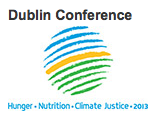At a two-day conference in Dublin, Ireland, global leaders discussed critical challenges related to addressing hunger, nutrition and climate justice.
Panel discussions focused on: risks, rights, knowledge and empowerment in the hunger, nutrition and climate justice dialogue; a vision for the world in 2050; local knowledge and local solutions; the post-2015 development agenda; effective policy responses; and commitments to lead.
 16 April 2013: At a two-day conference in Dublin, Ireland, global leaders discussed critical challenges related to addressing hunger, nutrition and climate justice. Panel discussions focused on: risks, rights, knowledge and empowerment in the hunger, nutrition and climate justice dialogue; a vision for the world in 2050; local knowledge and local solutions; the post-2015 development agenda; effective policy responses; and commitments to lead.
16 April 2013: At a two-day conference in Dublin, Ireland, global leaders discussed critical challenges related to addressing hunger, nutrition and climate justice. Panel discussions focused on: risks, rights, knowledge and empowerment in the hunger, nutrition and climate justice dialogue; a vision for the world in 2050; local knowledge and local solutions; the post-2015 development agenda; effective policy responses; and commitments to lead.
The Dublin Conference on Hunger, Nutrition, Climate Justice took place on 15-16 April 2013. Participants underscored that civil society and governments must prepare for the risks that climate change brings to rural livelihoods. They called for: shifting from approaches that are based on charity to approaches based on rights; and making scientific knowledge more readily available, as well as linking it to local research. Ireland, which currently holds the EU Presidency, described the development of its agriculture sector from the famines of the 1850s to its current success.
The Conference was informed by a series of case studies on local solutions and policy responses from the following countries: Bangladesh, Colombia, Ecuador, Ethiopia, Kenya, Lesotho, Malawi, Mongolia, Nepal, Niger, Philippines, Senegal, and the Caribbean region. Case studies from the Climate Change, Agriculture and Food Security (CCAFS) Research Program of the Consultative Group on International Agricultural Research (CGIAR) demonstrated how scientific and indigenous knowledge are being mobilized for positive change in Senegal through sharing climate climate information with local farmers.
On the post-2015 development agenda, participants noted the need to focus on creating resilience, fighting hunger and malnutrition, and adapting the agricultural sector to climate change.
The Conference, which was convened by the Irish Government and the Mary Robinson Foundation – Climate Justice, was organized in partnership with the World Food Programme (WFP) and CCAFS. President of Ireland Michael D. Higgins formally opened the conference, and speakers included former President of Ireland Mary Robinson and former US Vice-President Al Gore. [Conference Case Studies] [CCAFS Press Release][Irish Presidency of the EU 2013 webpage]